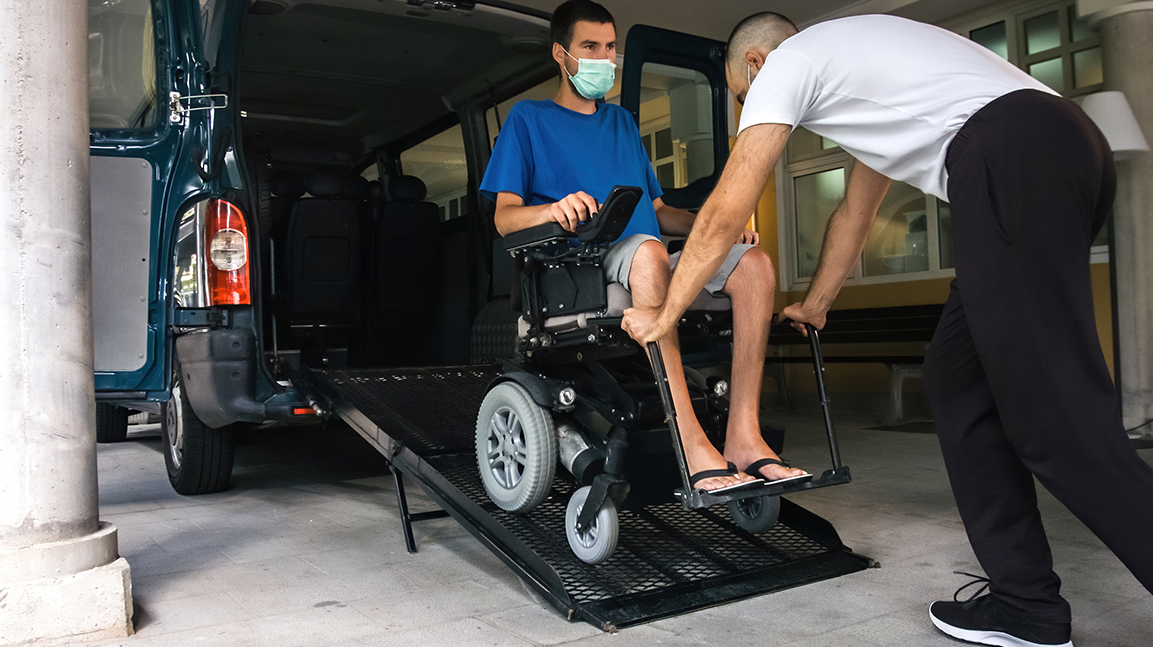Future Access to Care Through NEMT Services in Workers’ Compensation


By: Chris Pastor, Director of Transportation & Translation
Non-Emergency Medical Transportation (NEMT) is a crucial service in healthcare, providing essential support to individuals attending medical appointments, treatments, and facilities. This service is a lifeline for people with chronic conditions, disabilities, older people, and others who require reliable transportation for healthcare access. In workers’ compensation, NEMT helps injured employees recover by ensuring they attend medical appointments, therapy, and follow-up treatments promptly and safely. The global NEMT industry is a growing market worth $8.66 billion in 2021 and is expected to grow to $15.58 billion by 2028. With technological advancements and evolving patient needs, NEMT will become even more effective, improving access to care and enhancing outcomes for injured workers.
Current State of NEMT in Workers’ Compensation
In the current framework, NEMT is a critical service that supports injured workers by providing them access to necessary medical treatments and therapies. The goal is to facilitate a smooth and timely recovery process, enabling employees to return to work as soon as possible. Transportation options vary from taxis and ride-share services to specialized medical transport vehicles, depending on the individual’s specific health requirements. Despite challenges in providing consistent service to diverse areas, technological advancements are improving care coordination and overall experience for injured workers.
Future Innovations and Trends
Integration of Advanced Technologies
AI-driven routing and scheduling involve integrating AI algorithms to dynamically optimize transportation routes. This leads to shorter travel times, reduced waiting periods, and happier patients. Digital platforms and apps can help with real-time scheduling, tracking, and managing transportation services, making the process transparent and efficient for everyone involved. Artificial intelligence and data analytics help optimize routes and predict transportation needs, ultimately reducing wait times and missed appointments.
Autonomous and Connected Vehicles
Self-driving vans are being looked into for non-emergency medical transportation (NEMT) to boost efficiency and accessibility of services. These autonomous vehicles could offer patients a safe and reliable ride, especially those with mobility challenges. The shift to self-driving tech in NEMT aims to provide round-the-clock availability, reduce reliance on human drivers, and cut operational costs.
The transition towards fully autonomous vans involves significant technological advancements and overcoming regulatory obstacles. Some cities, such as Austin, TX, and Boston, MA, are taking a gradual approach to AV testing by initially allowing tests at specific times and under certain conditions to ensure safety and reliability. As the use of self-driving vans in non-emergency medical transport (NEMT) services becomes more widespread, continuous testing and improvements in autonomous vehicle technology will lead to more accessible and efficient medical transport services. During the initial testing phase, human drivers will supervise the autonomous vehicles.
Enhanced Coordination and Personalization
Future NEMT services will likely emphasize personalized and patient-centered approaches. This could mean more tailored transportation solutions that consider the individual’s medical condition, physical mobility, and comfort preferences. Enhanced coordination among healthcare providers, employers, and insurers, facilitated by integrated technology platforms, will ensure that transportation plans are well-aligned with the patient’s overall treatment and rehabilitation schedule.
Regulatory and Policy Developments
Regulatory and policy changes are expected in non-emergency medical transportation (NEMT) to improve service quality, accessibility, and affordability. These developments may include standardized protocols for NEMT services, enhanced safety regulations for transportation providers, and policies promoting environmentally sustainable transportation options.
Focus on Sustainability
Sustainability in NEMT will become increasingly important, shifting towards using eco-friendly vehicles, such as electric or hybrid models. This aligns with broader environmental goals and can lead to cost savings in the long term, benefiting employers, insurance companies, and employees alike.
The future of Non-Emergency Medical Transportation (NEMT) in workers’ compensation is changing rapidly thanks to new technology, regulations, and a deeper understanding of patients’ needs. As these trends evolve, NEMT will become more efficient, personalized, and integrated into the recovery and rehabilitation process, ultimately helping injured employees return to work faster and more effectively. These exciting improvements promise to enhance the overall effectiveness of workers’ compensation programs and ensure that injured workers receive the timely and appropriate care they need for their recovery.
At MTI America, we’re always monitoring trends and finding ways to incorporate new tech to improve our support of injured workers. We collaborate with our network partners to stay up-to-date on the latest tech advancements in transportation. The tech progress in our industry is truly exciting—seeing things we once only dreamed of now become a reality in the field or active research for future implementation. Learn more about how MTI America’s transportation services. https://www.mtiamerica.com/service/transportation/
Join us for our upcoming webinar, “Forward Motion: Navigating the Future of Transportation,” where Nikki Jackson and Chris Pastor will discuss the current state of transportation and its future. REGISTER TODAY! https://www.mtiamerica.com/forward-motion-navigating-the-future-of-transportation/
Source: https://www.globenewswire.com/en/news-release/2022/08/24/2503549/0/en/Non-Emergency-Medical-Transportation-Market-Size-Worth-15-57Bn-Globally-by-2028-to-Growing-at-9-0-CAGR-Exclusive-Report-by-The-Insight-Partners.html











